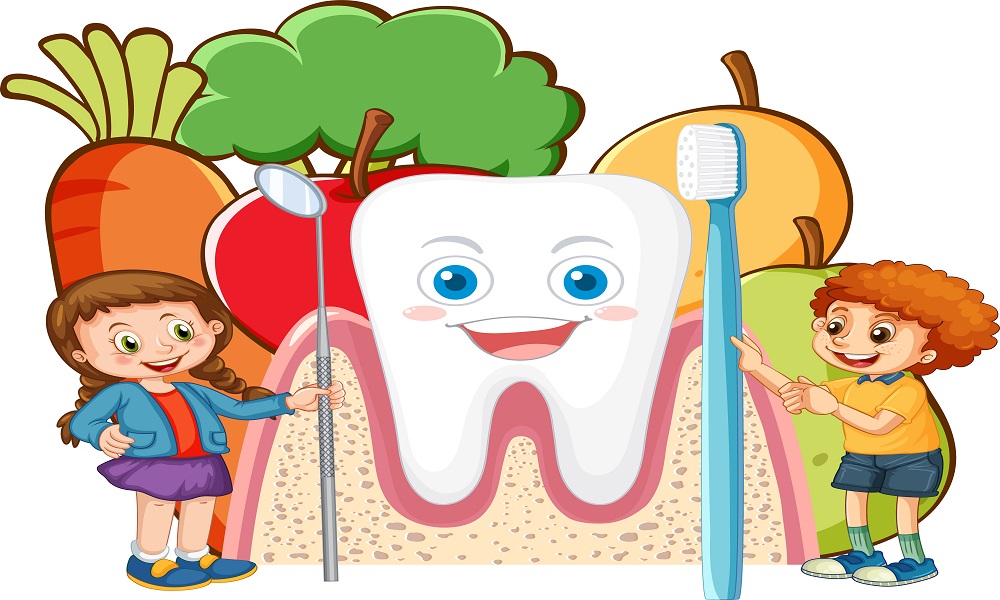Differences in incidence of caries have been observed in people depending on the food they are consuming or their diet. Diet is defined as the types and amounts of food eaten daily by an individual. A poor diet is significantly associated with the increase of dental caries. Diet influences the health of oral cavity as a whole.
A dynamic relationship exists between sugar and oral health. Integrity of teeth; quantity, composition and pH of saliva and pH of plaque is affected by diet. On consumption of sugars and other fermentable carbohydrates, tooth demineralization starts as salivary amylase hydrolyzes them. This provides substrate for oral bacteria to come in action and the bacteria acidogenic and aciduric lower the pH of saliva and plaque. On the contrary, a diet in low amounts of added sugars and fermentable carbohydrates, and high in calcium may favor re-mineralization.
SUGARS AND DENTAL CARIES:
• Protective factors: Salivary flow and components; proteins, antibacterial components and agents, calcium, fluoride and phosphate result in NO CARIES.
• Pathologic factors: Reduced salivary function, bacteria such as Streptococcus Mutans and lactobacillus, dietary components, including frequency and carbohydrates, result in CARIES.
CARBOHYDRATE CONTENT OF DIET:
• It is one of the most important factor in dental caries process. Carbohydrates are divided into four chemical groups: Monosaccharides, Disaccharides, Oligosaccharide, and Polysachharides. Starch and glycogen are Polysachharides which stores energy. Glucose and fructose are Monosaccharides, whereas sucrose and lactose are Disachharides. Amongst all, sucrose is considered as an arch criminal of dental caries. Polyols are alcohols of glucose and other sugars and are not considered as sugars.
• Certain terms in relation to sugars are – total sugars, added sugars and free sugars. Total sugars is the sum of all naturally-occurring sugar and added sugar in food and beverages. They include all Monosaccharides and Disaccharides, except polyols. Added sugars are those sugars added to food during processing and home preparations. For example; honey, molasses, brown sugar, corn sweetener, malt syrup, sucrose, lactose, glucose, high-fructose syrup, fruit juice concentrate, etc. Free sugars refers to all the Monosaccharides and Disachharides added by the manufacturer, cook and consumer, plus sugars present in honey, syrup and fruit juices naturally.
• Non-milk extrinsic sugars (NMES) are total sugars, excluding lactose in milk and milk products and sugars present in the cellular structure of fruits and vegetables.
RECOMMENDED LEVELS OF SUGAR INTAKE BY WHO:
- WHO has recommended a sugar intake of <10% of total energy intake for caries prevention.
- Intake of free sugars should be limited to 15-20 kg/person/year. This means, 40-55 gm/day in the presence of fluoride and <15 kg/year that means <40 gm/day in the absence of fluoride.
- Frequency of intake of food containing sugar should be limited to a maximum of four times a day.
VITAMIN CONTENT OF DIET:
Vitamin D: It is necessary for the overall development of teeth. It has been observed that people lacking Vitamin D may exhibit a slightly higher caries experience. Evidence shows that Vitamin D supplements may reduce the increment in dental caries; especially in children who may not be receiving adequate Vitamin D.
Vitamin B Complex: Vitamin B6 (Pyridoxine) selectively alters the oral flora by promoting the growth of non-cariogenic organisms and suppressing the cariogenic forms; and hence is an anti-caries agent.
INFLUENCE OF FLUORIDES ON SUGAR-CARIES RELATIONSHIP:
• It reduces and inhibits demineralization.
• It enhances re-mineralization of enamel.
• It affects plaque by inhibiting bacterial metabolism of sugar and, thus, reducing acid production.
AGE GROUPS AT RISK OF CARIES ON THE BASIS OF DIET:
• Infants and toddlers provided with prolonged breast-feeding as well as feeding bottle at bedtime on demand.
• People suffering from Xerostomia, Sjogren’s syndrome, irradiation of salivary glands.
• People with increased frequency of eating due to a medical problem such as GI diseases, uncontrolled diabetes and eating disorders.
• Athletes taking supplement drinks containing sugar.
• People with increased carbohydrate intake due to renal diseases or malnutrition.
• Drug addicts who crave sugar as a result of reduced salivary secretion.
• People of any age who are on long-term multiple medications.
DIETARY RECOMMENDATIONS:
• Develop a habit of maintaining balanced diet which includes fruits, vegetables, whole grains.
• Practise good oral hygiene methods; particularly use fluoridated toothpaste to boost oral health.
• Practice to use mouthwash regularly.
• Eat dairy products with fermentable carbohydrates and other sugars with the meal instead of eating in-between meals.
• Drink sweetened and acidic beverages with the meal containing food that can buffer acidogenic effects.
• Eat raw fruits and vegetables to increase salivary flow.
• Chew sugarless gums in between the meals to increase salivary flow.
• Avoid putting an infant or toddler to bed with a bottle of milk.
• Keep your eating frequency moderate to avoid repeated exposure of sugars and fermented carbohydrates.
Author:
Dr. Rucha Pandya, Lecturer, Karnavati School of Dentistry (KSD)
Disclaimer: The opinions / views expressed in this article are solely of the author in his / her individual capacity. They do not purport to reflect the opinions and/or views of the College and/or University or its members.






